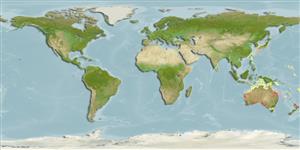>
Syngnathiformes (Pipefishes and seahorses) >
Syngnathidae (Pipefishes and seahorses) > Syngnathinae
Etymology: Filicampus: Latin, filum = thread + Greek, kampe = bent, curvature (Ref. 45335).
More on author: Castelnau.
Environment: milieu / climate zone / depth range / distribution range
पारिस्थितिकी
समुद्री ड़िमरसल; गहराई सीमा 2 - 27 m (Ref. 5316). Subtropical
Eastern Indian Ocean and Western Pacific: Australia (Western Australia, South Australia, Queensland and New South Wales).
Length at first maturity / आकार / वज़न / Age
Maturity: Lm ?, range 18 - ? cm
Max length : 29.6 cm SL पुल्लिंग / अलिंग; (Ref. 5316)
Adults occur over mud, sand, rubble and rocky bottoms. Ovoviviparous (Ref. 205). The male carries the eggs in a brood pouch which is found under the tail (Ref. 205). Males may be brooding at 17.5 cm SL.
Life cycle and mating behavior
परिपक्व अवधि | पुनरुत्पत्ति | मछलीऔ का अंडे देना | अंडे | Fecundity | लार्वा
Monogamous mating is observed as both obligate and genetic (Ref. 52884). Male carries the eggs in a brood pouch (Ref. 205).
Dawson, C.E., 1985. Indo-Pacific pipefishes (Red Sea to the Americas). The Gulf Coast Research Laboratory Ocean Springs, Mississippi, USA. (Ref. 5316)
IUCN Red List Status (Ref. 130435)
Threat to humans
Harmless
Human uses
अधिक जानकारी
Age/Sizeबाढ़Length-weightLength-lengthLength-frequenciesमौरफोमैटरिक्सआकृति विज्ञानलार्वालारवल गतिकीभर्तीबहुतायतBRUVS
संदर्भजलीयकृषिजलीयकृषि रूपरेखाखींचआनुवंशिकीElectrophoresesहैरेटिबिलटीबीमारीप्रक्रमणNutrientsMass conversion
सहयोगीयोतस्वीरेStamps, Coins Misc.ध्वनिसिगुयटिरारफ्तारतैरने के प्रकारगिल क्षेत्रOtolithsदिमागदृष्टि
साधन
Special reports
Download XML
इंटरनेट स्रोत
Estimates based on models
Preferred temperature (Ref.
123201): 17 - 27.3, mean 24.6 °C (based on 609 cells).
Phylogenetic diversity index (Ref.
82804): PD
50 = 1.0000 [Uniqueness, from 0.5 = low to 2.0 = high].
Bayesian length-weight: a=0.00037 (0.00016 - 0.00085), b=3.18 (2.99 - 3.37), in cm total length, based on LWR estimates for this (Sub)family-body shape (Ref.
93245).
Trophic level (Ref.
69278): 3.5 ±0.5 se; based on size and trophs of closest relatives
लौटाव (Ref.
120179): ऊंचा, न्यूनतम जनसंख्या दुगनी समय अवलागत 15 महीने। (Preliminary K or Fecundity.).
Fishing Vulnerability (Ref.
59153): Low to moderate vulnerability (26 of 100).
